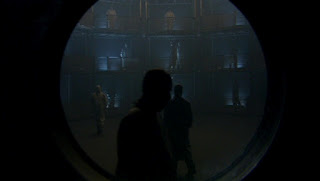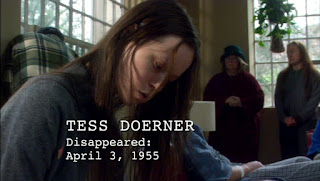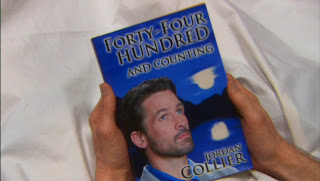 The Maginot Line: Stories from the Fiction Desk 3
The Maginot Line: Stories from the Fiction Desk 3, edited by Rob Redman, The Fiction Desk, 2012. 143 pages
Overall Rating: 7/10
The Fiction Desk website
The Maginot Line at Goodreads.
In the third installment of
The Fiction Desk anthologies, editor Rob Redman tells us that there is, as there were in the previous two volumes, a theme running throughout the stories. Only this time he refuses to tell us what that theme is. This is fine, except that when searching for any kind of link, a reader can easily spot unintentional themes. Perhaps Redman is challenging us not with a puzzle, but with an exercise for our imaginations. And since I do like a good challenge, I'll do a little theme-searching, which I'll add following the story reviews.
I like the bits about the cover selection process. As with the introduction to
the first issue of Shock Totem, I enjoy learning about the publishing process of young journals. I hope this theme will be revisited. Check out Redman's article "
Cover Stories" on the
Fiction Desk blog for even more detail.
The Maginot Line by Matt Plass. 7/10
"
Last time it was a wild man in the woods. This time it might be the murmurs from the cellar. Or a UFO over Friar's Hill. Or the Chinese."
After receiving a disturbing call from his father, a man drives out to the woods to the secluded family house. His isolated and aging father is becoming a little unstable, and tonight he might be having another episode. "
The woods are behaving very strangely," he tells his son.
This is a genuinely touching story, particularly if you can relate. (I too have an aging, lonely isolated father.) The story is a character sketch that goes beyond character and character relationships. It incorporates notions of the world growing smaller as we age and the necessity of purpose in one's life. There is a near sinister event reminiscent of Algernon Blackwood's "The Willows," as the narrative borders on the supernatural, yet the supernatural flavour quickly dissipates and reveals something all too human.
My review is vague because the story is short and I don't wish to weaken its effect. I will add that the story's title is significant, and I encourage readers to look up its meaning.
The Man of the House by Mandy Taggart. 7/10
An elderly man sits in his chair protecting the house and its occupants from a danger he believes to exist. The protagonist's identity and purpose are clear early on, and yet they are supposed to be clear, as there is something else in the story lurking nearby to surprise the reader and even chill the room a little. Another short sketch-like piece, "The Man of the House" manages to surprise (at least it did me) and elevate the simple narrative with a strong emotional element.
Automatic Pilot by Justin D. Anderson. 7/10
"
Carl knew his wife Martha had been fired when he saw her car already parked in the driveway." That opening line is indicative of some pre-existing tension. Martha's car could be in the driveway for a myriad of reasons, but Carl
knows that it's because his wife has been fired.
There is a slightly ominous quality to the story. Though the narrative is subdued, like its fairly passive and peace-keeping Carl, the neighbourhood trees are blighted, one household already stricken by a destructive branch. Another metaphorical branch looms over Carl and Martha's relationship, with their innocent daughter caught in between. Carl even wonders "
what he and Martha would be if they didn't have Lucy. It horrified him to imagine it." This thought, along with the final scene, is a clue to their blighted and destructive relationship.
A very well written story, and quite effective. An alternative possibility for the story would be to not have had the dead branch strike the neighbours' home, so that the ones looming over Carl and Martha would appear more weighty. By giving the destructive element a physical manifestation, the greater emotional threat seems to lose some of its power.
(So far the first three stories are very good. If only they weren't so similar.)
The Rocket Man by Benjamin Johncock. 7/10
This story is seven minutes long. I'm tempted to leave it at that, for any more information will mar this unique little fiction. The prose is straightforward, practically descriptive (as opposed to poetically). Fatalistic even. Like the story itself.
[
Spoilers of a sort.] Apocalyptic, and though we are in the future we are so much in the present. With the lack of detail aside from the hundred and fifty year-olds that are put to rest, this story is timeless. I do wonder at the patience amid looming disaster, the lack of chaos; have we changed so much in this far future? I don't think we can. Scientifically the sun will burn its fuel, use up its helium and hydrogen, eventually becoming a
red giant (though I recently listened to a radio program during which a scientist theorized that it'll instead become a
white dwarf). This should happen in about four billion years, and I doubt we'll be at all recognizable then. Despite this loose point, it's an excellent and disturbing story. Just that image of the birds falling from the sky.
Exocet by Andrew Jury. 6/10
"
Sometimes, in a moment it takes for a ball to fall or not fall, a father's life is decided one way or the other."
Narrator Jim Evanson's dad, Ernie "The Exocet" Evanson, has reappeared unexpectedly following a two-year absence. In the past he's reappeared only to borrow money and continually disappoint, so Jim is less than sympathetic when daddy's at the door. Indeed he does need money, but he's quit drinking and wants the loan so that he, a former semi-finalist, can once again compete in the world snooker championships. There's an additional twist: Ernie is going blind.
Andrew Jury's "Glenda" appeared in
All These Little Worlds, and both these stories deal with a man's relationship with a parent figure. In the previous it was a mother-in-law, while here it's a father. Both narrators are rational and fairly stable average figures, both are going through separation, while the parents are both a little outlandish, a little different from what you'd expect an average man's parent/in-law would be. Otherwise the pieces are quite different. While "Glenda" was treated with a fair amount of humour, "Exotet" is more reflective, more solemn and bordering on tragedy, both in terms of a father's failure and a son's resentment for a lost childhood. A good story and certainly different in tone from the previous four in this volume, I'm thinking only that it could have been a little shorter, as the solemn tone had me getting a little restless and the ending was somewhat too subdued. The real tragedy is that the implication that the narrator too is a failed father, but this idea is only grazed and hence the tragedy not actually accomplished.
The Pest by Shari Aarlton. 6/10
In a quiet village a kennel owner lawfully disrupts the community by taking advantage of its innocent members. Ms. Boothman is skilled at using the law to her advantage, and sues anyone who crosses her, or annoys her, in any way. The story is told through the point of view of her neighbour's brother, a real estate lawyer who has a fair understanding of civil and criminal law. The title is clever as it reflects many aspects of the story, including that item which the ending hinges on. I was left a little dissatisfied with the ending but I won't write why since I don't believe in spoiling any recently-published stories. It is nonetheless a good story, and it managed to get me angry (at Ms. Boothman) as I read, thinking of how I'd take care of such a pest.
Trevor Gets Shot by Claire Blechman. 7/10
High school risk-taker Trevor, wanting to be Badass, asks geeky narrator Sean to shoot him. He wants a flesh wound, something that would leave a mean-looking scar. He's got a reputation to uphold, one for being "crazy," chasing trains on his bike and performing dangerous stunts. Yet the story is not really about Trevor, but about his faithful side-kick Sean. While Trevor is the outgoing "crazy" one, Sean is the one we suspect has craziness built into his core. The story is subtle, fun on the verge of nutty, yet with an underlying flavour of disturbing teenage behaviour.
"Blind" by Harvey Marcus. 7/10
The narrator in this one is pretending to be blind. A young man is troubled at being so anonymous on the bustling London streets, and has taken to carrying a blind man's walking stick. Observing a blind woman maneuvering at ease one afternoon, he decides on impulse to leave his job and dedicate himself to being blind. As the story is short I won't anymore plot points away. "Blind" deals with concepts of anonymity, social blindness and seeking one's place amid the chaotic urban world. Good, straightforward writing allows me to accept the story's slight leaps, such as why and how would someone carry a white walking stick, and the fact that the story-line borders on the absurd makes it more believable than works of pure realism. Though I wasn't impressed with Marcus's story "
How to Fall in Love with an Air Hostess" that appeared in
Various Authors last year, "Blind" gets my vote as the strongest story in
The Maginot Line.
"Faith" by Ian Sales. 7/10
A series of genuinely haunting vignettes of astronauts or cosmonauts returning to Earth following early milestone missions in the 1960s and 1970s. Each little episode features a traumatic episode, the events playing out experiences in the isolation of the spaceman's mind. The vignettes are essentially psychological exaggerations of the isolation of space, humans subjected to an an environment foreign to body and mind. Space is a vast unknown, as is the human psyche (or at least was back in the 1960s). Particularly effective is the man locked in his capsule at sea, waiting to be rescued and learning that his capsule was picked up, and though NASA can see him through the interior camera, the craft is mysteriously empty. Chilling stuff.
Theme Search.
After two stories, "The Maginot Line" and "The Man of the House" I discovered several possible themes.
Nutty fathers clinging to old houses. One story with leaves, the other
about leaving. Memories, dangers, passing time. Creepiness. Too early to speculate.
After three stories ("Automatic Pilot") I notice, along with the cover art work, more leaves and trees. There are still more tense fathers, innocent children and family homes. More creepiness too. So far we have strictly male points of view.
Story three, "The Rocket Man," kills the male p.o.v. idea, but the creepiness is heightened. There's another tree. Frenzied and frozen parents.
"Exocet" features no trees, branches or leaves, but there are a number of pool cues. Once again an unreliable father--no, make that two in this one. No more creepiness (snooker doesn't count).
Back to trees with "The Pest," orchards this time. A semi-absent father and a family home. (I think I'm failing at this theme search.)
No trees in "Trevor Gets Shot," though we do have more semi-absent fathers. Creepiness by association through US gun availability.
"Blind" has trees and a walking stick. (I noticed the titles of the last two stories, placed together, make up "Blind Faith." Is that a clever clue?)
Last story "Faith" has no trees whatsoever. No fathers. Nothing really. It sure pushes that creepiness thing though.
So this failed theme search has helped me realise the varied nature of these stories. We do have a vast array of settings, from forest to school to home, urban and suburban, tree house and haunted house, oceans and outer space. We have quite a few deaths (no births though) and injuries, both physical and psychological.
My vote for theme is pure
craziness. In "The Maginot Line" we have an older man losing his grip on reality. In "Man of the House" we have a man who lost that grip years ago. In "Automatic Pilot" the father suffers a batty breakdown, while in "Exocet" the father (the older one) has always been unstable. Ms. Boothman in "The Pest" is a sociopath, and Sean in "Trevor Gets Shot" sets out to prove he is crazier than the title character. In "Blind" the narrator does a crazy thing by trying to keep his sanity, and finally in faith a number of men get spaced out, if you will.
Let me know if you have other theme suggestions, while I wait for issue four of this wonderful quarterly to arrive.
 Carrier (Episode 2.7)
Carrier (Episode 2.7) At the 4400 Centre, Shawn is lost. Without Collier the centre is struggling as is its young healer. Enter Matthew Ross (Garrett Dillahunt) to save the day. Yes, more Jesus references are brought in with a replacement named "Matthew," but this dude's more of a businessman than a cult leader, sporting striped shirts and colourful matching ties. Matthew steps in to advise Shawn, but really he appears to be taking control. The man is not unknown to Shawn since apparently Collier had mentioned him as a go-to guy. At first Shawn is grateful for the man's involvement, but soon feels Matthew is another Collier, and makes it clear that he is unwilling to be manipulated by him the way he was by Collier. First he is determined to leave, but later, with Lily's help, decides to set up a foundation to help needy people.
At the 4400 Centre, Shawn is lost. Without Collier the centre is struggling as is its young healer. Enter Matthew Ross (Garrett Dillahunt) to save the day. Yes, more Jesus references are brought in with a replacement named "Matthew," but this dude's more of a businessman than a cult leader, sporting striped shirts and colourful matching ties. Matthew steps in to advise Shawn, but really he appears to be taking control. The man is not unknown to Shawn since apparently Collier had mentioned him as a go-to guy. At first Shawn is grateful for the man's involvement, but soon feels Matthew is another Collier, and makes it clear that he is unwilling to be manipulated by him the way he was by Collier. First he is determined to leave, but later, with Lily's help, decides to set up a foundation to help needy people. Patrick is apparently travelling, leaving Lily to commit terrible atrocities. It turns out that she is in collusion with Matthew in keeping Shawn at the centre, since the foundation idea was actually Matthew's. Turns out neither Lily nor Matthew believe in the 4400 cause, and Lily only wants daycare for her daughter (which is odd since Lily, prior to this episode, isn't working). Lily's worst atrocity, however, is her poor English, as she delivers a laugh-out-loud phrase, and I'm surprised no one on the set caught this. Referring to the letters Shawn receives daily, begging for him to cure them, Lily says: "Each one is sadder than the next." It should be "...sadder than the last," in that each new letter gets sadder and sadder. But what Lily is actually saying is that while the first letter is very sad, tragic even, the next one is still sad but not as much, and the next even less so, and so forth until the letters eventually start becoming quite happy and eventually ecstatic.
Patrick is apparently travelling, leaving Lily to commit terrible atrocities. It turns out that she is in collusion with Matthew in keeping Shawn at the centre, since the foundation idea was actually Matthew's. Turns out neither Lily nor Matthew believe in the 4400 cause, and Lily only wants daycare for her daughter (which is odd since Lily, prior to this episode, isn't working). Lily's worst atrocity, however, is her poor English, as she delivers a laugh-out-loud phrase, and I'm surprised no one on the set caught this. Referring to the letters Shawn receives daily, begging for him to cure them, Lily says: "Each one is sadder than the next." It should be "...sadder than the last," in that each new letter gets sadder and sadder. But what Lily is actually saying is that while the first letter is very sad, tragic even, the next one is still sad but not as much, and the next even less so, and so forth until the letters eventually start becoming quite happy and eventually ecstatic.

















































